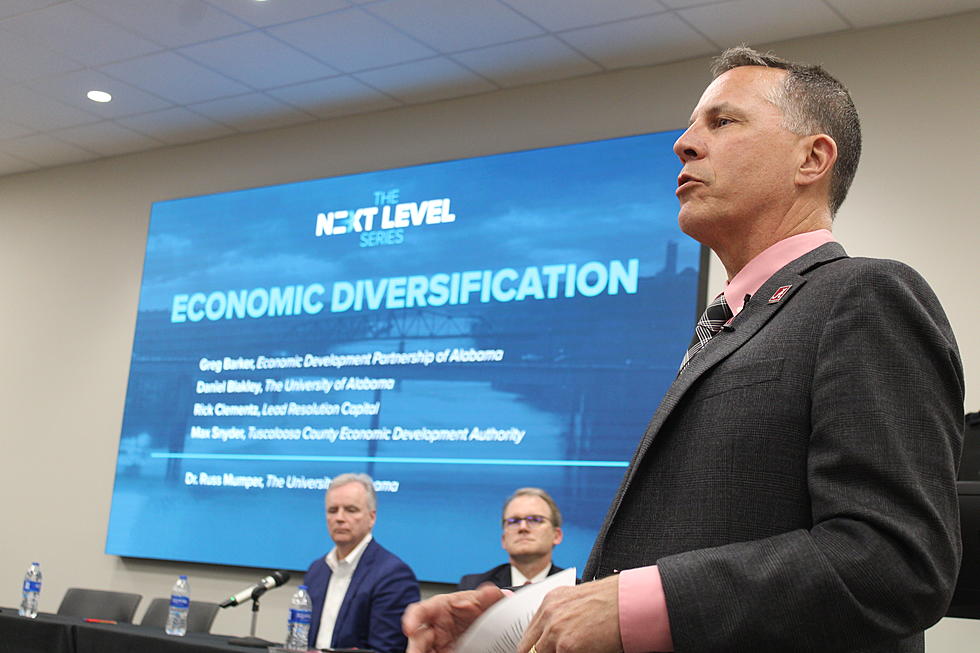
Tuscaloosa’s Economy Must Diversify to Continue Growth and Weather Bad Times, Experts Say
Leaders in West Alabama must continue to take proactive steps to diversify its economy to ensure its continued growth, a panel of experts said Wednesday afternoon.
The conversation was the fifth event in the Chamber of Commerce of West Alabama's Next Level Series — seven different public forums that seek to examine all aspects of life in the Tuscaloosa area through discussions with top leaders from the public, private and non-profit sectors.
The Series took last week off as many in the Tuscaloosa area traveled for Spring Break but returned Wednesday with a conversation about economic diversification moderated by Russ Mumper, The University of Alabama’s vice president for research and economic development.

The panel generally adopted the World Trade Organization's definition of economic diversification for their discussion, explaining the term as "the shift toward a more varied structure of domestic production and trade with a view to increasing productivity, creating jobs and providing the base for sustained poverty-reducing growth."
In colloquial terms, it generally amounts to making sure all an economy's eggs aren't in a single basket so that the overall health of the system is not singularly dependent on the success of a single sector of industry.
"It kind of reminds me of investing," said Dan Blakley, UA's Assistant Vice President for Research Agreements & Commercialization. "You've all heard about diversifying your portfolio and this is kind of the same thing. So if you have a dip in one sector like a dip in one stock, you have some balance."
Blakley said Tuscaloosa already has a leg up on much of its competition for attracting new businesses and industries to the area thanks to the University of Alabama. He said the school has a $2 billion impact on the local economy, creates 13,000 jobs of its own and boasts ever-increasing enrollment numbers.
Even the concept of economic development has changed in recent years, said Greg Barker, president of the statewide Economic Development Partnership of Alabama.
"It's important to think about the way we used to define economic development in Alabama," Barker said. "Before, in Alabama, when we would say 'Hey are you involved in economic development?' we really meant 'Are you involved in business attraction?' and that was it. We really weren't talking about business attraction in total, we were talking about industrial attraction."
Now, the conversation has broadened, Barker said, to include topics of research and innovation, sustainability, equality, the matter of remote work options and much more.
And of course, the best economic development leaders in the world would be doing relatively fruitless work without growing and supporting the workforce required to fill jobs created by that development.
"Workforce development is not only Alabama's biggest issue, it's not only the United States' biggest issue, it's the world's greatest issue," Barker said. "No matter what we do, it's just one of those problems where you're never able to declare victory because hopefully you'll always be proud but not satisfied."
All the experts on the panel are deeply involved in economic diversification efforts in West Alabama, but perhaps none more so than Max Snyder, Business Development Director at the Tuscaloosa County Economic Development Authority.
Snyder said the TCEDA has developed six target sectors that they proactively work to draw to the Tuscaloosa area. They include advanced manufacturing, energy, healthcare, information and technology, research and development and corporate operations.
"Now we are drilling down further into these sectors to ask, 'OK, exactly where are our strong suits?'" Snyder said. "When you talk about advance manufacturing, in my professional opinion, we are great at automotive but aerospace may be a bit of a reach and we need to consider how we handle trying to draw those types of projects."
The key is for the West Alabama economy to be varied enough to be safely insulated from bad tidings in any one sector. The panel pointed to the old JVC America plant that once produced VHS tapes and CDs before huge changes in the technology sector left little demand for the now outdated tools.
Hundreds of workers were laid off in waves before the plant finally closed for good in 2019, but West Alabama's economy survived because even in JVC's heyday, local leaders were aggressively working to bring Mercedes Benz U.S. International to Tuscaloosa County.
MBUSI's recent shift in focus to the production of electric vehicles will almost certainly prevent their vehicles from going the way of the VHS tape, but local leaders must still be vigilant and ensure the area's economy is as diversified as possible.
The Next Level Series returns on Wednesday, March 30th, for a conversation about the quality of life in West Alabama, specifically focusing on recreational and cultural arts opportunities.
Ideas and information generated from all seven iterations of the Series will then be unpacked at the Next Level Summit, a three-day affair scheduled for mid-April during which the Chamber will develop its next five-year plan for growth and action.
Stay connected to the Tuscaloosa Thread for more coverage from the Series and Summit as they unfold.
New Tuscaloosa Restaurants & Retail in 2021
Tuscaloosa Restaurants and Stores That Closed for Good in 2021
More From Tuscaloosa Thread









